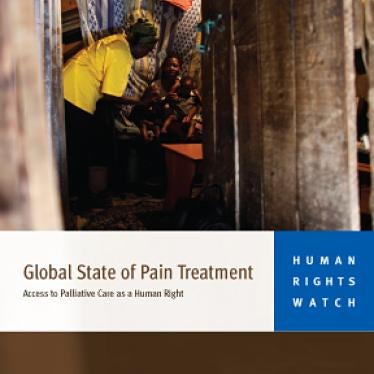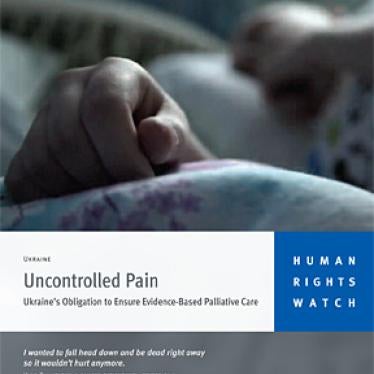June 11, 2013
Prosecutor General of the Russian Federation
Yury Yakovlevich Chayka
Moscow, Russian Federation
Dear Yury Yakovlevich,
I am writing to express Human Rights Watch’s concerns about the May 20, 2013 conviction of Aleftina Khorinyak and Lidia Tabarintseva on charges of illegal trafficking of potent substances (article 234 part 3of the Russian Criminal Code) and forgery of documents (article 327 part 2) for helping a terminally ill man, Mr. Viktor Sechin, who was in constant severe pain, obtain opioid pain medicines. Human Rights Watch considers the use of criminal sanctions in this case disproportionate and that it gives rise to violations of international human rights norms. We urge the prosecutor’s office to support Khorinyak and Tabarintseva’s appeal in the Krasnoyarski Regional Court to annul the guilty verdict and acquit them of criminal charges.
According to trial documents, Mr. Sechin, who had muscular dystrophy since childhood and was unable to walk, was diagnosed with cancer in 2007. By late 2008 his cancer advanced to the terminal stage, and he needed strong pain medication to relieve severe and constant pain he was experiencing as a result of the illness. Mr. Sechin’s general practitioner prescribed him several pain medications, including tramadol, an opioid pain reliever effective for moderate pain. Mr. Sechin received his medical care and medications free of charge under the state-run program designed to benefit socially vulnerable persons.
According to the defendants’ lawyer, Mr. Sechin’s general practitioner testified[1]during trial that in late April 2009 the pharmacy linked to Sechin’s hospital (belonging to a pharmacy chain “Gubernskie apteki”) ran out of its state-subsidized supply of tramadol. Other pharmacies in the chain, however, did have stock of tramadol that was not subsidized. The doctor declined to prescribe Mr. Sechin medication that was not part of the subsidized program, because he was entitled to receive the drugs free of charge. As a result, Mr. Sechin did not receive another prescription for tramadol from his doctor until late May 2009, after the pharmacy had replenished its state-subsidized supply of tramadol.
This had dramatic consequences for Mr. Sechin, who was left to suffer from severe pain without access to sufficiently strong medications to relieve it. A social worker familiar with Mr. Sechin’s condition and who was a witness at the trial, testified during a hearing on July 23, 2012: “S.V.R [Mr. Sechin] experienced severe pain; he just lied there slowly dying [from it]. It was difficult to watch.” [2]
Unable to tolerate the pain, Mr. Sechin asked Dr. Khorinyak, a long-time family friend who had observed his condition for many years, to help him get tramadol. As a medical doctor bound by the Hippocratic Oath, Khorinyak wrote Mr. Sechin two prescriptions. Lidia Tabarintseva bought the medication for Mr. Sechin, which lasted him until late May, when his general practitioner renewed the prescription for the free tramadol.
In 2011, the same year as Mr. Sechin passed away from cancer,the State Drug Control Agency discovered Dr. Khorinyak’s prescriptions and opened a criminal case against her and Mrs. Tabarintseva. The Oktyabrski District Court of Krasnoyarsk then ruled that the prescriptions were issued and filled in violation of Russian law and sentenced both women to a fine of 15,000 rubles.
As part of our global work on the right to palliative care, Human Rights Watch has conducted research on access to pain medicines in Russia since 2010. Our research has found that regulations on medical use of controlled substances in Russia are overly bureaucratic and excessively onerous, interfering with proper prescribing and with the ability of patients to access these medications. A report detailing these findings is forthcoming. Russia has among the strictest drug control regulations in the world, going far beyond what is required under international law. Russia not only strictly regulates morphine and other drugs in its class but also tramadol, a significantly weaker opioid that is not a controlled substance internationally.
Under international law, countries have an obligation to regulate the availability and accessibility of strong opioid medications, such as morphine, to prevent its misuse and diversion. However, drug control efforts must be continually balanced against the responsibility to ensure opioid availability for medical purposes, in line with the right to health under international law.[3]For example, Russia is a party to the International Covenant on Economic, Social and Cultural Rights, which specifies that everyone has a right “to the enjoyment of the highest attainable standard of physical and mental health.”[4]Palliative care is an essential part of healthcare and states have an obligation to refrain from enacting policies or undertaking actions that arbitrarily interfere with the provision of palliative care.[5]Human Rights Watch believes that this obligation requires states to ensure that their drug control regulations do not unnecessarily, and therefore arbitrarily, impede the availability and accessibility of essential palliative care medications such as opioids. In this case, not only did state laws and policy prevented Mr. Sechin accessing essential pain medication, which he medically required and for which he was lawfully eligible, but they led tocriminal sanctions on health care professionals for the provision of essential pain medicine for medical use. This is clearly in violation of Russia’s obligations under the right to health.
In addition, in this case, the facts demonstrate that the drug laws meant that Mr. Sechin was forced to suffer from severe and unnecessary pain. Such suffering, where it is severe and within the state’s knowledge and capacity to take reasonable measure to prevent it, may amount to cruel, inhuman, and degrading treatment. The UN Special Rapporteur on torture or other cruel, inhuman or degrading treatment or punishment has specified that, in his expert opinion, “the de facto denial of access to pain relief, if it causes severe pain and suffering, constitutes cruel, inhuman or degrading treatment or punishment.”[6]In this case both Dr. Khorinyak and Mrs. Tabarintseva are being punished for intervening to prevent a situation of unnecessary severe pain and suffering.
While Dr. Khorinyak and Mrs. Tabarintseva may have violated the letter of Russia’s drug control regulations, they did so out of humanitarian considerations to help a patient with a legitimate medical need, who was deprived access to medications for arbitrary, bureaucratic reasons. As a medical professional, Dr. Khorinyak felt duty bound to help Mr. Sechin, and her actions essentially did no more than seek to end a situation in which Mr. Sechin’s rights were being violated. The prosecution presented no evidence whatsoever that Dr. Khorinyak and Mrs. Tabarintseva personally benefited from prescribing and buying tramadol for Mr. Sechin, that any of the medication was used for non-medical purposes, or was diverted to the black market. We therefore consider the prosecution and conviction to be disproportionate and in violation of international human rights law.
We respectfully call for you to support Khorinyak and Tabarintseva’s appeal at the Krasnoyarski Regional Court to annul the Oktyabrski District Court’s guilty verdict.
Sincerely,
Hugh Williamson
Executive Director
Europe and Central Asia Division
Human Rights Watch
[1]Appeal letter to the Krasnoyarski Regional Court prepared by lawyer V.P. Bogdanov, May 30, 2013, on file with Human Rights Watch.
[2]Appeal letter to the Krasnoyarski Regional Court prepared by A. P. Khorinyak, May 29, 2013, on file with Human Rights Watch.
[3]World Health Organization, ”Cancer pain relief with a guide to opioid availability”, (Second
edition). Geneva, Switzerland: WHO, 1996, p. 56
[4]International Covenant on Economic, Social and Cultural Rights (ICESCR), Article 12, G.A. res. 2200A (XXI), 21 U.N.GAOR Supp. (No. 16) at 49, U.N. Doc. A/6316 (1966), 993 U.N.T.S. 3, entered into force January 3, 1976, ratified on October 16, 1973.
[5]UN Committee on Economic, Social and Cultural Rights, General Comment No. 14:The right to the highest attainable standard of health, November 8, 2000.
[6]Human Rights Council, Report of the Special Rapporteur on torture and other cruel, inhuman or degrading treatment or punishment, Manfred Nowak, A/HRC/10/44, January 14, 2009, http://daccessdds.un.org/doc/UNDOC/GEN/G09/103/12/PDF/G0910312.pdf?OpenE..., para. 72.






